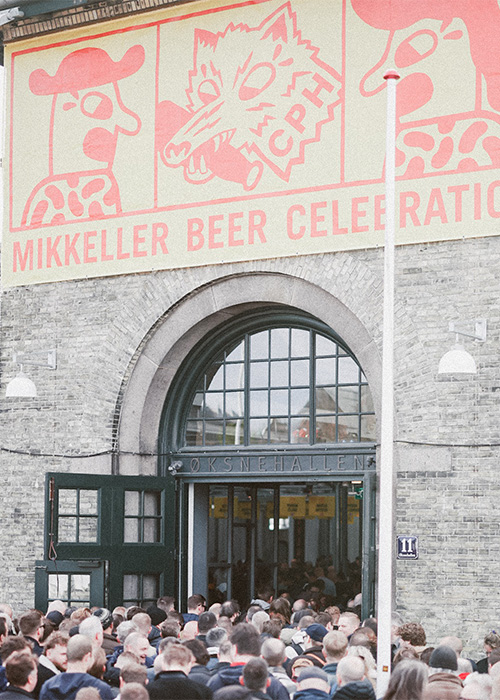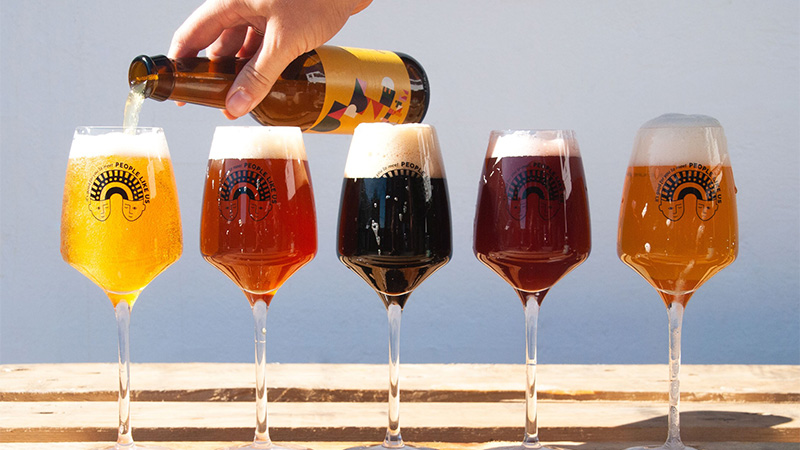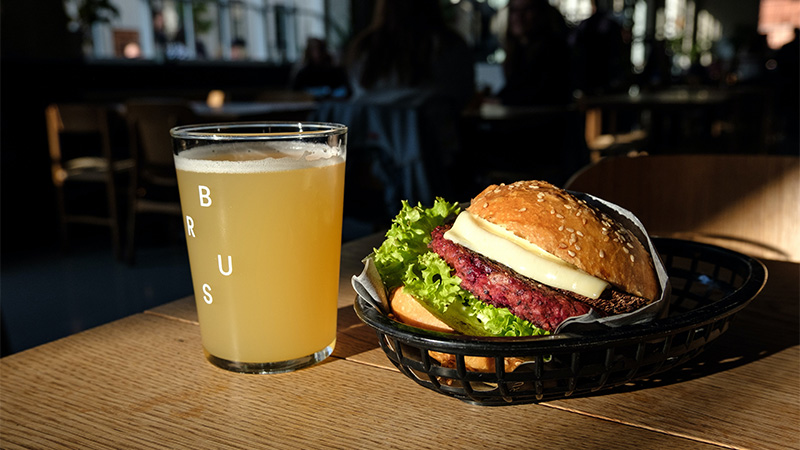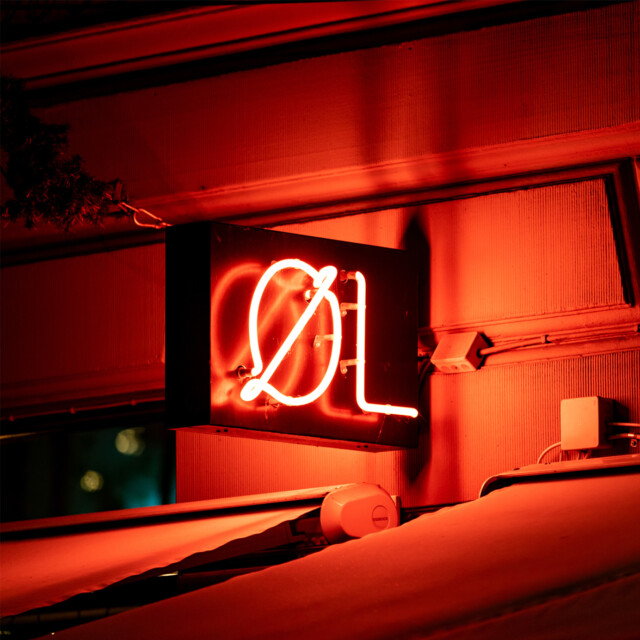At People Like Us, a beer bar in the Copenhagen district of Nørrebro, freshly painted outdoor furniture glistens in bright sunshine. It’s Friday, April 21, and three picnic tables have just been daubed in bold pink, with a note attached in Danish (“Nymalet,” or freshly painted) and English (Wet Paint). Inside the bar there’s a flutter of human activity. Preparations, it appears, are being made for opening.
But People Like Us won’t be opening today. The brewery that runs the bar — also called People Like Us — went bankrupt just before Christmas, weighed down by Covid-induced debt. The subsequent legal process means that, on this unseasonably warm and bright spring afternoon, the resuscitated brewery cannot sell beer to be consumed on-site yet — as three besuited middle-aged men, excited to see the activity, discover at the door.
People Like Us’s Covid experience is not unique in this city, long heralded as Europe’s capital of craft beer. Some had it even worse, like the much-vaunted brewery Broaden and Build, owned by former Noma chef Matt Orlando, which was forced to close during the pandemic just a year after it had opened.
And Covid-19 is not the only issue. Mikkeller, the city’s most important modern brewery, has experienced a tumultuous few years, as a slew of complaints from employees about unsafe working conditions, harassment, and bullying at the brewery’s now-closed facility in San Diego and at the Warpigs brewpub in Copenhagen caught up with them. That followed protests that Mikkeller labels “profit[ed] from beer with racist and sexist labels.”
Another key Copenhagen brewer and bar owner, Soren Parker Wagner of Dry & Bitter Brewing, resigned in 2021 amid widespread allegations of physical violence and sexual coercion.
It’s a seriously troubling blend. So is Copenhagen, proudly described on the city’s tourist website as “the center of craft beer,” still Europe’s best place for a modern beer — or has everything changed?
Mikkel’s Town
If Mikkel Bjergsø, founder and owner of Mikkeller, fancies a bite to eat, there are plenty of options close to Mikkeller HQ in Humletorvet, a modern piazza in the neighborhood of Vesterbro. Five minutes’ walk away is a branch of Ramen to Biiru, a Japanese noodle chain; 15 minutes will get you to taco restaurant La Neta, founded in Stockholm and brought to Copenhagen in 2017; and two minutes from there is Warpigs, a brewpub-cum-Texas-BBQ joint in the heart of Copenhagen’s buzzing Meatpacking District.
Bjergsø owns them all, and much more besides. According to the Mikkeller website, he owns 17 different Copenhagen venues, taking in branches of his restaurants, bars, and a handful of stand-alone venues, like Selma, a restaurant selling traditional open-faced rye bread sandwiches, and Bobs Hytte, a classic Copenhagen brown bar close to Mikkeller HQ.
“Former female employees — including one who worked at Warpigs — cited multiple incidents of gender-based bullying, harassment, retaliation, and indifference to quality control and employee safety protocols at Mikkeller.”
It looks good, but that’s not the whole story. Mikkeller’s travails in the U.S. — which have seen all four U.S. venues shut, including a brewery in San Diego — have crossed the Atlantic. A company that has received millions of dollars in investment from New-York-based Orkila Capital in recent years decided in April to shutter the brewing operation at Mikkeller Baghaven, its wild/sour brewery and bar on Copenhagen’s harborfront; and Keith Shore, whose art is the physical face of Mikkeller, having adorned the products for 13 years, recently left the company.
Bjergsø declined to be interviewed for this article, citing preparations for Mikkeller Beer Celebration Copenhagen (MBCC), which took place on the weekend of May 5 and 6. In a sense, though, MBCC demonstrates how the brewery’s standing has fallen among craft-beer drinkers and breweries: Although a Mikkeller spokesperson said tickets had “sold extremely well,” there were still tickets available for Friday and Saturday lunchtime sessions just three days before an event that used to be sold out weeks in advance.

That is almost entirely down to revelations about Mikkeller’s workplace culture. Former female employees — including one who worked at Warpigs — cited multiple incidents of gender-based bullying, harassment, retaliation, and indifference to quality control and employee safety protocols at Mikkeller. Much of the testimony is shocking. At Warpigs, the former employee said, the general manager “pantomimed male masturbation in front of her and other employees on several occasions when he wanted her to stop talking.”
At first, the company said it had been unaware of the situation, then backtracked. Mikkeller’s response to the criticism suggested it was more interested in making the situation disappear than dealing with the serious incidents raised.
Breweries, particularly from the U.S. and U.K., pulled out of 2021’s festival as a result. Although Mikkeller has since worked with Hand & Heart (the Berlin-based workplace consultancy and investigations company that produced a 10-part podcast, Super Cool Toxic Workplace, about the company’s work culture) on a Reconciliation Programme, the damage looks permanent. The most significant breweries that pulled out in 2021 — such as The Veil, Jester King and London’s The Kernel — have not returned.
It represents a remarkable reversal of fortunes for a company that, as recently as early 2020, seemed to have the world at its feet. At the Social Revolution By Beer festival held in March that year, which Bjergsø attended, rumors flew around that Carlsberg, the global brewing giant based in Copenhagen, had made a substantial offer to buy Mikkeller. Much has changed since then.
Resurgent Revolutionaries
If the pandemic hurt Mikkeller, it crushed People Like Us. This brewery, set up to provide work opportunities for autistic people, organized the Social Revolution By Beer festival. It was the culmination of years of hard work by founder Lars Carlsen, but was hamstrung by the first Covid-related constraints in Denmark, restricting how many people could gather in one place. Worse was to come.
People Like Us’s unique structure, which entails employing many people, some on contracts of just five or six hours a week, proved its downfall. Because of that, the company didn’t qualify for government employee assistance, and was forced to look elsewhere for cash. It took on investment and signed a deal to sell beer in supermarkets, but three months on that was canceled. It was painfully overextended and by December, the game was up.

Enter Paul Roome. A long-term admirer of the company, the British co-owner of Copenhagen liquor brand and bottle shop Phantom Spirits (and former Mikkeller employee) decided to rally support. His vision was of a cooperatively owned brewery, and by the end of January he and PLU accountant Henrik Johansen had enough support to make it viable. Twenty-six people have invested a total of 1.3 million Kroner ($190,500), with another 1 million Kroner ($146,500) coming from a loan, and negotiations with the bankruptcy curator have resulted in the company being bought back.
Roome was keen to preserve not only People Like Us’s unique model but also the bar, known in the Copenhagen beer scene for its community-focused approach. “There’s a sense of closeness at the PLU bar,” he says. “There’s a great feeling to it.”
Supermarkets and Slaughterhouses
While People Like Us was stung by its involvement with supermarkets, To Øl, a brewery that runs one of Copenhagen’s iconic modern beer bars, BRUS, has found a new way to succeed, with a line of session-strength craft beers stocked in many of Denmark’s biggest supermarket chains.
“There’s a sense, though, that troubled times have helped Copenhagen’s beer scene to turn the page on its flashier days.”
The impact of that can be felt at BRUS, too, where lower-ABV ales and lagers (including cask ale) are more in evidence post-Covid. On a recent Friday visit, 13 of the 23 beers on tap were under 6 percent ABV, a notable shift in a city long known for punchy IPAs. “People are drinking a little bit lighter,” says Christian Astorp, CMO at To Øl.
A new entrant, ABEN, also benefited from Covid. Founded as a brewery in 2017 in the Danish city of Kolding, ABEN was preparing to convert a former slaughterhouse in the Meatpacking District into a brewery-cum-venue when the pandemic hit. Although those plans stalled, its outside space proved a lifeline. “It was one of the few places that were centrally located and able to accommodate a lot of people,” says founder and owner Philip Hulgaard.
It allowed Hulgaard and team to raise their ambitions for the 1,000-square-meter building, which opened this year. The result is a space where tables are set amid brewing vessels, where a large open kitchen plays host to pop-up cooks and where, with its tiles and stainless steel, the atmosphere can be more nightclub than brewpub.
From Hype to Hygge
On a sunny evening, it’s clear that Copenhagen is a beer town. The days of queuing at Mikkeller and Friends’ bottle shop for the latest American imports may be over, but the huge crowds outside BRUS and ABEN, the horde of youngsters drinking cans of Tuborg on Dronning Louise’s Bridge, and the older group the next morning at a sold-out beer tasting at Norrebro Bryghus, all demonstrate that hops and malt have deep roots here.
It’s clearly not perfect. Each of these crowds is infinitely more varied than the ownership of Copenhagen’s biggest beer venues, which remains overwhelmingly male, and the financial pressures that everyone in Europe is feeling at the moment have not disappeared.

There’s a sense, though, that troubled times have helped Copenhagen’s beer scene to turn the page on its flashier days. There’s a greater focus on warmth and welcome, on session-strength beers, on hygge rather than hype. Bjergsø, for example, recently posted a lengthy list of aspirations for 2023 on his Facebook account, which included the promise to “make sure our customers leave with a smile and recognise our exceptional service.”
New ventures are still taking flight, like Too Old To Die Young Brewing, which opened a year ago, and wild fermentation specialists Insight Cellars, run by former Mikkeller Baghaven brewer Ehren Schmidt, which released its first beers in late April.
People Like Us’s beer bar, meanwhile, reopened to the public on Thursday, May 4, pink seats and all. “If Covid did one good thing,” says Carlsen, “It has made us more thoughtful. We are more focused on community now.” You might say the same for Copenhagen.
